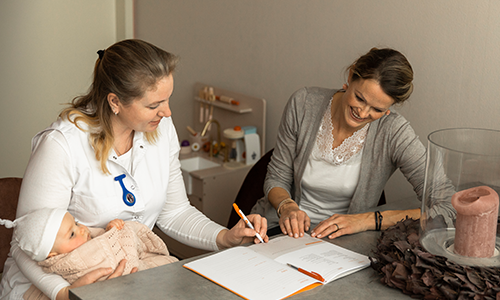Breastfeeding and contraception
If you are breastfeeding, you are somewhat limited in your choice of contraception. Breastfeeding often inhibits your menstruation, but you always have an ovulation before that. So you do not know when you will be fertile again. If you are breastfeeding there are some recommended contraception options:
-
The mini pill (Cerazette)
-
The Mirena hormone spiral (or possibly the copper spiral)
-
Condoms
-
Injection pill
-
Contraception stick (Implanon)
These do not affect breast milk production. We will always discuss this with you at the end of the childbirth.
Breast inflammation
Anyone who is breastfeeding can get a breast infection. This is a blocked milk duct. It leads to hot, painful, hard (disks) and sometimes red patches in your chest, fever, it feels like you have the flu and you can have a headache. The cause may be that you no longer give night food, a duct is blocked, you have cracked nipples, you have overproduction, you are tired, have a fungal infection (thrush), wearing a tight or constricting bra or a combination of these.
You can always get advice from our practice, La Leche League, Association of Breastfeeding Naturally and Baby & breast.
Thrush
This is a fungal infection where you can have sore nipples and the skin on the nipples often itches and looks fiery red, sometimes with white tips or flakes. The baby often develops thrush in the mouth or a burning spotty diaper rash. The baby can drink worse because the sucking hurts. Sometimes the baby has no symptoms at all, but mother and child still need to be treated.
Arrangement days
These are days when supply and demand are re-aligned as the baby grows. The baby is growing so he or she wants to drink more. This means your baby will drink more often, just like the first days after giving birth. Your baby quickly seems dissatisfied and then asks for food again within a short time. This can even happen each hour. This is normal baby behavior, the more often your baby drinks, the more often your breasts are empty and your brain receives a signal that milk must be made again.
Storing breast milk
Fresh breast milk:
-
At room temperature (20 ° C) 5-10 hours
-
In the refrigerator (5 ° C) for up to 5 days
-
In the freezer (-15 ° C) 3 months
-
In the freezer (-20 ° C) 3-6 months
-
After heating up: 1 hour
Thawed breast milk:
-
At room temperature (20 ° C) 1 hour
-
In the refrigerator (5 ° C) 24 hours
-
After heating up: 1 hour
Always let frozen breast milk thaw slowly before heating it up, i.e. in the refrigerator. Breast milk can be warmed safely and easily in the bath of Marie (“au bain Marie”) or with a bottle warmer. Bottle warmers that bring the breast milk in the bottle to 35 ° C nice and quickly (“in less than two minutes”) are no good. We do not recommend heating in the microwave, as this will destroy the nutrients.

